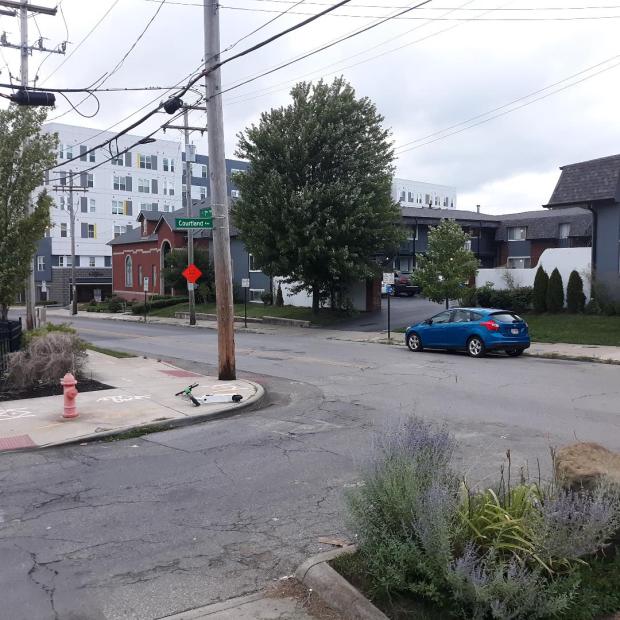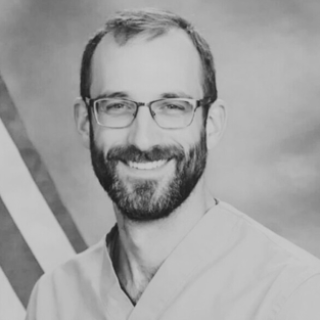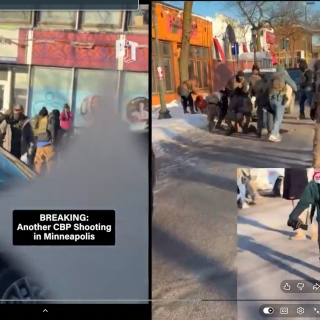When and where is non-conforming high density new development appropriate? For several years now, residents from across Columbus, especially in urban neighborhoods (but not limited to) have been at odds with developers and city officials on this question.
For example, the University District’s Pavey Square initially proposed to demolish an entire city block of historic structures and replace them with a 10-story apartment complex. A 5-story 117-unit apartment building at South 18th and Oak Streets in Old Towne East brought concerns from nearby residents about height and density. And most recently, the fight over the Pizutti proposal to re-develop the former Giant Eagle site in Schumacher Place with a 262-unit 62-foot-tall mixed use apartment complex. Although zoning variances were approved by Columbus City Council, the project has been allowed to proceed but the re-zoning is being appealed in the courts by nearby homeowners. Many more examples of contentious developments could be added to this list.
One recent proposed development has shown that there are those who will go to any lengths to advance their agenda of high-density new development. Chicago-based developer, the Peerless Development Group has proposed building a 133-unit 70-foot-tall apartment building at 50 East 7th Avenue. Eight different zoning variances that include height (from 35 feet – 70 feet) and parking (251-70) will be needed for approval in order for this project to proceed. The site is located directly north of the Kroger parking lot at King Ave and North High Street and would require the demolition of an existing three-story apartment complex. The proposed project also lies within the boundaries of the University Area Commission (UAC) and Weinland Park Civic Association (WPCA).
Peerless Development is being represented by attorney Michael Shannon. As a former city of Columbus Development Regulations Administrator, Shannon was responsible for all zoning and building code enforcement in Columbus. He’s also a former partner of the well-connected Crabbe, Brown, and James law firm for 17 years, where he represented local and national developers. Shannon now works for another City Hall-favored law firm, Underhill & Hodge, and he is listed as a City of Columbus Legislative Agent (lobbyist) for numerous high-profile developers such as the Edwards Companies, Schiff Properties, Campus Partners, Kaufmann Group and The Pizutti Companies. Shannon is representing the Pizutti Company and their controversial Schumacher Place Giant Eagle development project, and he also represented the developers of Pavey Square and the King and High 7-story new development that has been recently approved where that historic block has almost entirely been demolished.
The neighboring institution to the immediate west of this Peerless Development-proposed 70-foot-tall apartment complex is the two-story 7th Avenue Community Missionary Baptist Church which has been serving the Weinland Park community for over 50 years and has been guided by Pastor Roscoe Robey since 2009. Located at the northeast corner of 7th Avenue and North High Street and to the immediate west of the church sits an existing 6-story student housing apartment building named The Uncommons. The Uncommons replaced a much needed and utilized laundromat and Dollar Store for students and low-income residents of the surrounding neighborhood. If the new Peerless development is approved by Columbus City Council, the two-story church will be sandwiched in between 6 and 7-story primarily student housing developments.
The Weinland Park neighborhood has been portrayed by some as a success story in urban redevelopment that claims to have created a mixed income area while also removing a well-established gang element that has made the area a somewhat safer to live. It is also no secret that because of Weinland Park’s close proximity to the Ohio State University campus, that OSU and its Campus Partners redevelopment arm has had a vested financial interest in cleaning up this neighborhood. But even with a fair concentration of subsidized Section 8 housing in Weinland Park, new affordable housing for low-income renters and homebuyers is nearly non-existent and gentrification is more the norm. The neighborhood is also home to one of – if not the most densely tax abated – single family home districts in Columbus which boasts about 200 tax abated parcels.
Weinland Park is represented on the University Area Commission with three area commissioners: Michael Wilkos, Davide Cugini and Brian Williams. Wilkos is currently the Director of Community Research for the Columbus Foundation and formerly worked with the United Way of Central Ohio, Capitol South Community Urban Redevelopment Corporation, and the City of Columbus Neighborhood Services. Wilkos is also a key member of the non-compromising pro high-density advocacy group NeighborsForMoreNeighbors(N4MN) Columbus. According to the group’s website, it appears that the Weinland Park neighborhood is home to several other chief supporters of this group. Wilkos’ bio also claims that he takes an active role as a volunteer in the Weinland Park neighborhood. He has served as a University Area Commissioner since February of 2021.
Commissioner Davide Cugini is an attorney that focuses on real estate or property law, a CPA, a licensed real estate agent, and according to the City of Columbus, he holds a general contractor’s license. In 2020, Cugini built a new 2,880-square foot home in the neighborhood in which the Franklin County Auditor has not yet assessed a value. Cugini has also served as a commissioner since February of 2021.
It is believed that officers and or members of the WPCA had been informed of the possible sale of the existing three-story apartment building and the proposed new 7-story development around March of 2021. The Auditor’s website shows that the property was purchased by 50-60 E. 7th LLC for $3.25 million. At some point between March and April, it was decided by members of the Housing Committee that a subcommittee should be formed to work with Peerless to create a Memorandum of Understanding (MOU) between the developer and the Weinland Park Civic Association. Michael Wilkos would serve as the chairperson for the sub-committee.
On May 5th the WPCA Housing Committee met. Housing Committee Co-Chair Matt Adair, a former senior planner for the city of Columbus’s Neighborhood Design Center, holds a master’s degree in city and regional planning. He started out the meeting by stating: “The status quo really isn’t productive. We have found a really amazing and talented facilitator from Dennison Place, Kathy Fox, who is extremely experienced, and she has offered a unique process for this committee to handle the Peerless development.”
Who better to recruit and ordain to facilitate a controversial development to fulfill the desires of Adair, his high-density advocates of Weinland Park and the N4MN group than a person who has worked for the Pizutti Companies and is a former board member of Campus Partners for Community Urban Redevelopment? According to 7th Avenue Church, Fox had already met with the developer prior to the announcement of her being selected as a facilitator for the sub-committee at the May 5th meeting and she clearly demonstrated her partiality towards promoting the developer’s needs.
Some of the numerous concerns of the project that had been brought forth prior to the meeting included: seven stories is too tall especially being next to the two-story church; loss of sun will impact residential gardens; reduction in property values; gentrification; the University District shouldn’t have to solve the housing shortage for the region; desire for less student housing; needing multi-units for families to live in; and a need for more homeowners not renters. The project turns its back on the neighborhood. It will radically change the neighborhood.
At The WPCA’s June 24th membership meeting, the vote on the 5-page MOU for the Peerless development was first on the agenda. Sub-Committee chair Wilkos first spoke of his expounded vast expertise on affordable housing and stated that the sub-committee had met several times over the last two months. He gave his pitch for the 7-story development by stating, “There has been a chronic underbuilding of housing for the last decade.” He stated that more density will address the affordable housing crisis and it will bring down monthly rents and housing prices. He even made the claim that, “the number one reason for gentrification is that there are not enough units for Columbus’s booming population.”
Wilkos went on to state that this project, which is eligible for a tax abatement, is a “mixed income project.” Twenty-six out of the 133 units will be set aside for those with incomes between $47,000 and $57,800. Are these units affordable for the majority of those 54,000 folks whose income levels are well below $47,000 and who make up the majority of those who are paying 50% or more of their incomes towards housing? Affordable for the low-income residents of Weinland Park? This is just another campus apartment complex to house students and white-collar professionals and couples.
These 10% of 80% AMI and 100% AMI set asides are doing absolutely nothing to address Columbus’ affordable housing crisis and people like Wilkos and the development community that he strokes are using them to push through their tax abated high-density projects while making the false claim that these types of economically and socially segregated apartment projects are addressing housing affordability.
Other WPCA key members who were present at the membership meeting boasted about the importance of the MOU and how this process eliminated a lot of wasted time on concerned citizens debating on a project that “the city would overwhelmingly move forward on anyways.”
Pastor Robey and Deacon Riley Goosby would have none of it. After continually being interrupted by WPCA Treasurer Chris Micciche while speaking, the Deacon stated, “gentrification has occurred in Weinland Park because people have been priced out of the neighborhood.”
“The 7th Avenue Church does not endorse the MOU because it is not seen in the best interest of 7th Avenue and the surrounding community that this is going to be a benefit. Minority and diversity is going to be kicked out the window. The MOU does not hit on the things that 7th Avenue thinks are important. This MOU was not done fairly and equitably,” he stated.
Because leaders of the 7th Avenue Baptist Church are not residents of Weinland Park they were not permitted to vote on the MOU, but were permitted to participate in the sub-committee. The church also believed that the “sub-committee was created by the Housing Committee in order to push this project through.” Church leaders were even told by WPCA members that, “You don’t live in the community, so you don’t have a voice.” They even went as far as to “question their leadership” and claimed that church leaders were “sexist.” The 7th Avenue Church condemned the derogatory comments and felt their concerns about minority representation for employment of the new development as well as the project not being a family friendly development had been disregarded by the leadership of the WPCA and the facilitator. This institution which has had a valued presence in the Weinland Park neighborhood for over 50 years decided they had been humiliated enough and it was time to pull out of the Michael Wilkos-chaired sub-committee.
The WPCA voted unanimously in favor of the MOU. The University Area Commissions Zoning Committee heard this zoning application at two different meetings and voted against the zoning variances by a vote of 4-2 both times with one abstention on one of the two votes.
I signed up to speak while representing Columbus Neighbors United against the 7th Avenue Development at the August 8th UAC monthly meeting. Unfortunately, according to the UAC by-laws, the public is only permitted to speak for two minutes on zoning variances. The by-laws also allow for a motion to be made to extend the two-minute time limit. I had prepared a four-minute speech and a commissioner made a motion to extend my time on my behalf, but the motion was defeated by one vote. When the buzzer sounded indicating my two minutes had ended, I kept speaking while trying to get a few more words in and Weinland Parks area Commissioner David Cugini began shouting “Time, Time, Time” in order to drown out my additional comments and stop me from speaking further. When Cugini was given his commissioner-allotted one-minute to speak on the variance, the buzzer sounded and as he tried to continue speaking, he was shouted down by fellow commissioner Tom Wildman. The UAC voted in favor of the 8 zoning variances by a vote of 9-7.
Just over 20 letters were sent to University Area Commissioners in support of the variances. The contents of the letters were in essence boilerplate co-authored written letters most likely by a Weinland Park resident and supporter of the N4MN group. Much of the language in the letters included pro-high-density notes that can be “surprisingly” found on the N4MN website. The so-called NIMBY’s in this story are those Not In My Back Yard supporters of nothing less than high-density market rate apartment projects who are not willing to compromise with other residents. It’s either their way or no way, and apparently they will devise whatever underhanded and unethical strategies it takes to get these projects rammed down our throats.




